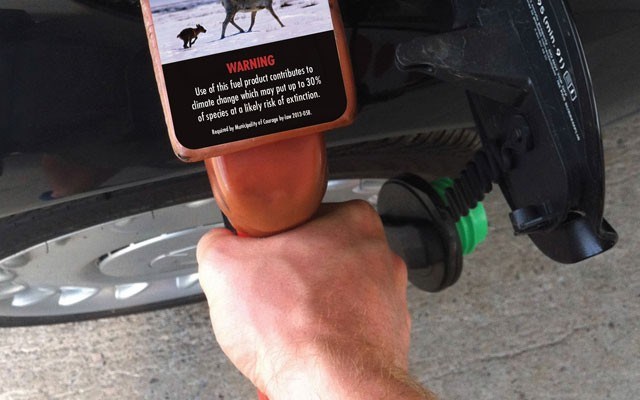When graphic warning labels were added to cigarette packaging in the early 2000s, smoking rates began to decline.
Now, a Toronto-based non-profit wants to do the same thing for climate change by placing warning labels on gas pumps.
"They'll depict locally relevant climate change impacts such as forest fires or drought or species extinction, and they would be kind of tailored to every municipality or region that they're in, just to make sure they're relevant to the people who see them," said Matt Hulse, B.C. campaign director for Our Horizon — the group that has been pushing for the warning labels since 2013.
On Aug. 26, Hulse presented to the board of the Squamish-Lillooet Regional District (SLRD).
"Our organization is going around to municipalities and local or regional districts asking them to one, support the implementation of these labels in B.C., and two, to consider taking the labels back to their own municipalities and implementing them there."
The idea is to reconnect people with the problem of climate change in a way that hits home.
"Fossil fuel consumption through automobiles has a huge contribution to (climate change)," Hulse said.
"But we don't think about that when we fill up our cars. We think about price and that's about it, and we need to think about the bigger picture and how our own role fits in to climate change."
As it stands, there aren't many widespread, viable alternatives to burning fossil fuels when it comes to transportation.
"Hopefully it will make them feel frustrated with the lack of alternatives... We think this frustration will translate into demand for alternatives."
Our Horizon's project will be part of a motion at this month's Union of BC Municipalities (UBCM) conference in Vancouver. If passed, the UBCM would take the issue to the province.
At the Aug. 26 SLRD meeting, the board resolved to support the UBCM motion.
"Each director will be able to vote their conscience at UBCM, so they're not bound by the motion at the SLRD table," said SLRD chair Jack Crompton.
"I think it's good to be reminded about the implications of the way we live, and the choices we make, and from the research that they've done it has proved to create change. I think that's why we gave support to the project."
In his presentation, Hulse noted that the campaign has been endorsed by hundreds of academics in fields ranging from health and science to politics and law.
In January, the District of West Vancouver council unanimously passed a resolution to implement the warning labels, becoming the first Canadian municipality to do so. According to Our Horizon, the resolution has now been supported by over 50 communities across the country.
Once the warning labels are implemented, the hope is that shifting attitudes will lead to a push for meaningful policy change.
"We've been working on combating smoking for a long time, and we've had success with that, but they only started to introduce major policy decisions like higher taxes or no smoking zones or banning smoking inside once the public was aware of the huge burden that smoking has on health and also our tax dollar," Hulse said.
"It's been a change of attitude that's allowed policy decisions to go forward, and we think we need to change attitudes again around gasoline consumption, and then hopefully policy decisions will follow."




